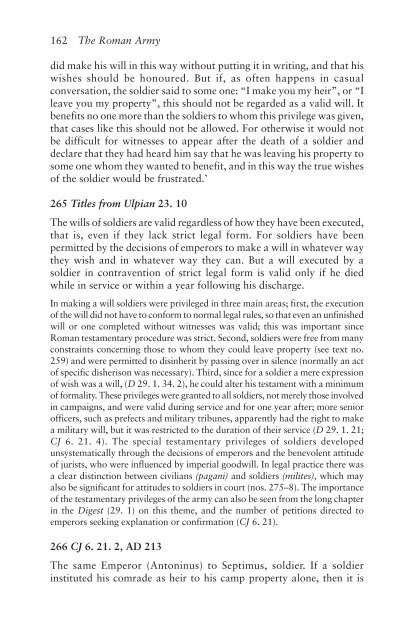The Roman Army, 31 BC–AD 337: A Sourcebook
The Roman Army, 31 BC–AD 337: A Sourcebook
The Roman Army, 31 BC–AD 337: A Sourcebook
Create successful ePaper yourself
Turn your PDF publications into a flip-book with our unique Google optimized e-Paper software.
162 <strong>The</strong> <strong>Roman</strong> <strong>Army</strong><br />
did make his will in this way without putting it in writing, and that his<br />
wishes should be honoured. But if, as often happens in casual<br />
conversation, the soldier said to some one: “I make you my heir”, or “I<br />
leave you my property”, this should not be regarded as a valid will. It<br />
benefits no one more than the soldiers to whom this privilege was given,<br />
that cases like this should not be allowed. For otherwise it would not<br />
be difficult for witnesses to appear after the death of a soldier and<br />
declare that they had heard him say that he was leaving his property to<br />
some one whom they wanted to benefit, and in this way the true wishes<br />
of the soldier would be frustrated.’<br />
265 Titles from Ulpian 23. 10<br />
<strong>The</strong> wills of soldiers are valid regardless of how they have been executed,<br />
that is, even if they lack strict legal form. For soldiers have been<br />
permitted by the decisions of emperors to make a will in whatever way<br />
they wish and in whatever way they can. But a will executed by a<br />
soldier in contravention of strict legal form is valid only if he died<br />
while in service or within a year following his discharge.<br />
In making a will soldiers were privileged in three main areas; first, the execution<br />
of the will did not have to conform to normal legal rules, so that even an unfinished<br />
will or one completed without witnesses was valid; this was important since<br />
<strong>Roman</strong> testamentary procedure was strict. Second, soldiers were free from many<br />
constraints concerning those to whom they could leave property (see text no.<br />
259) and were permitted to disinherit by passing over in silence (normally an act<br />
of specific disherison was necessary). Third, since for a soldier a mere expression<br />
of wish was a will, (D 29. 1. 34. 2), he could alter his testament with a minimum<br />
of formality. <strong>The</strong>se privileges were granted to all soldiers, not merely those involved<br />
in campaigns, and were valid during service and for one year after; more senior<br />
officers, such as prefects and military tribunes, apparently had the right to make<br />
a military will, but it was restricted to the duration of their service (D 29. 1. 21;<br />
CJ 6. 21. 4). <strong>The</strong> special testamentary privileges of soldiers developed<br />
unsystematically through the decisions of emperors and the benevolent attitude<br />
of jurists, who were influenced by imperial goodwill. In legal practice there was<br />
a clear distinction between civilians (pagani) and soldiers (milites), which may<br />
also be significant for attitudes to soldiers in court (nos. 275–8). <strong>The</strong> importance<br />
of the testamentary privileges of the army can also be seen from the long chapter<br />
in the Digest (29. 1) on this theme, and the number of petitions directed to<br />
emperors seeking explanation or confirmation (CJ 6. 21).<br />
266 CJ 6. 21. 2, AD 213<br />
<strong>The</strong> same Emperor (Antoninus) to Septimus, soldier. If a soldier<br />
instituted his comrade as heir to his camp property alone, then it is



